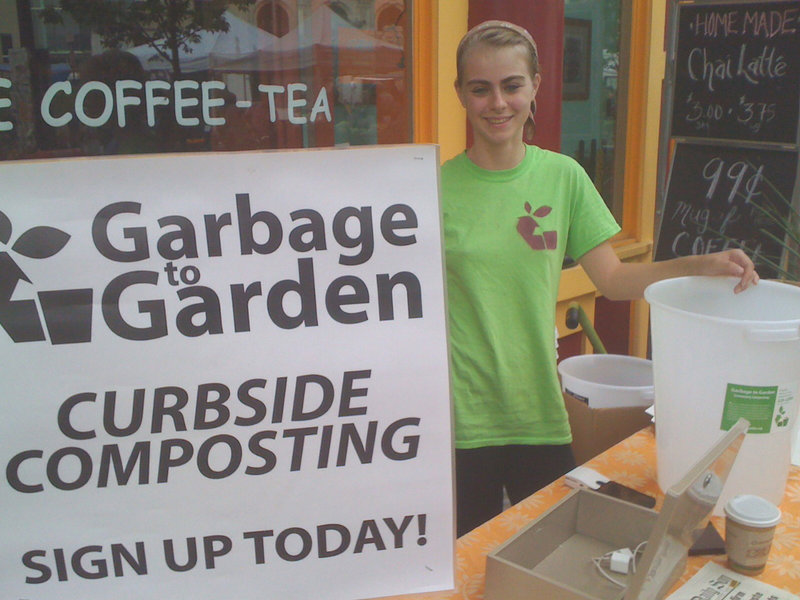For less than a month, Sable Sanborn and Tyler Frank have been seeking customers for their new venture, Garbage to Garden, that picks up food waste outside people’s homes and then transforms it into compost. The cooperative began accepting customers during August’s First Friday Art Walk, and already has more than 100 households participating in the program.
“We run on donations,” Sanborn said. “The minimum is $11 a month and that covers gas. A lot of people donate more. If you can’t afford that, you can come in and volunteer.”
The program serves customers in Portland, Falmouth and South Portland.
“We’ll probably move to Cape Elizabeth soon,” Sanborn said. “And I’ve had three people ask for Scarborough.”
Participants receive a covered plastic bucket in which to place all food scraps, including meat and dairy products (which typically cannot be composted on a backyard scale). Homeowners then place the bucket outside their homes, along with garbage bags and recycling bins on their designated trash pick-up day.
Frank and Sanborn pick up the buckets and leave a clean one in its place. Currently, Garbage to Garden is hauling the food waste to Durham for composting, but the company is seeking a site closer to Portland. Participants can request buckets of finished compost any time they need it.
Garbage to Garden intends to donate compost to community gardens and has partnered with the University of Southern Maine to do a service learning project. Others! coffee shop in Monument Square has agreed to be a place where customers can pick up buckets.
The venture reflects a desire within the local community to address the issue of food waste in a sustainable manner.
For instance, a company called Resurgam Zero Food Waste works with restaurants and events in southern Maine to compost organic material. And ecomaine, the recycling and incinerator company for 45 municipalities in southern Maine, is currently seeking proposals from consulting firms to conduct a study exploring ways to remove food scraps and yard debris from the waste stream. The proposals could recommend any technology, including composting and anaerobic digestion.
According to the U.S. Environmental Protection Agency, 13.9 percent of municipal waste is made up of food scraps and 13.4 percent comprises yard waste, on average. Food waste tossed into garbage bags in any ecomaine community is currently incinerated, which is not an ideal situation. Food waste doesn’t burn well because it is so wet, and burning it wastes a valuable resource that can be used to build soil fertility.
The proposals are due by Sept. 20.
Anyone interested in signing up for the Garbage to Garden service can visit garbagetogarden.org to register, or find the company’s representatives at the Wednesday and Saturday farmers markets in Portland.
This story was updated on May 19, 2014 to clarify that Garbage to Garden has not filed for 501c3 status.
Staff Writer Avery Yale Kamila can be contacted at 791-6297 or at: akamila@pressherald.com
Twitter: AveryYaleKamila
Send questions/comments to the editors.


